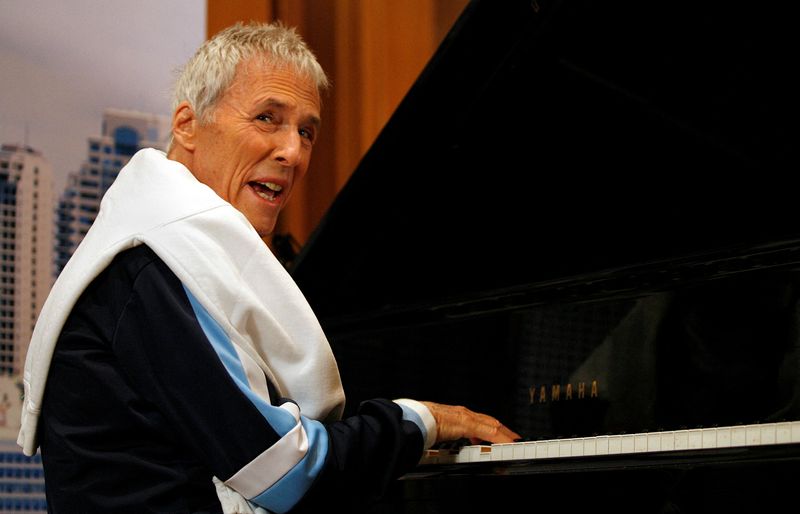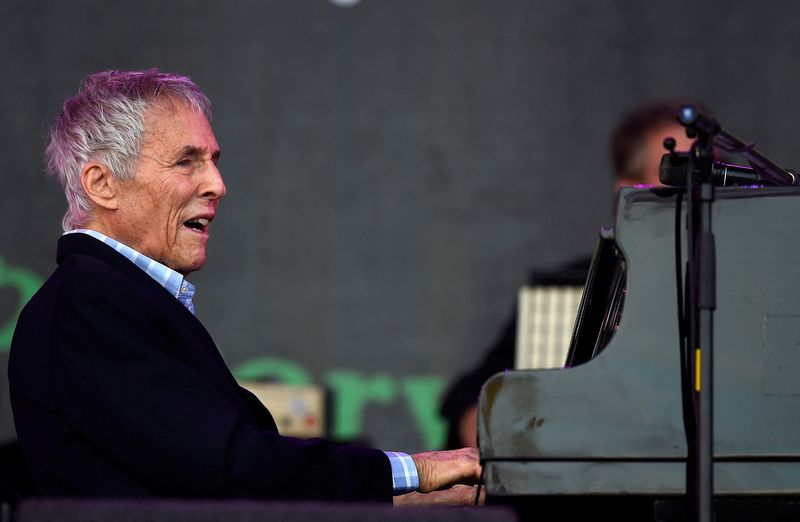By Bill Trott
(Reuters) -Composer Burt Bacharach, whose hits such as "Do You Know the Way to San Jose" and "Raindrops Keep Fallin' on My Head" provided a mellow alternative soundtrack to rock and roll in the 1960s and 1970s, has died at the age of 94, his publicist told Reuters on Thursday.
Bacharach died of natural causes at his home in the Los Angeles area on Wednesday with his family by his side.
His songs, many written in a 16-year collaboration with lyricist Hal David, were neither rock nor strictly pop. They filled American radio and were featured in major movies, making them as frequently heard in the 1960s and early 1970s as works by the Beatles, Rolling Stones and Bob Dylan.
Bacharach wrote more than 500 songs, many featuring a tinkling piano and subtly seductive horn hooks. He penned hits for singers ranging from Dionne Warwick to the Carpenters. More than 1,200 artists performed his songs, which won six Grammys and three Oscars. Bacharach and David had 30 Top-40 hits in the '60s alone.
"He was just different," David once told an interviewer. "Innovative, original. His music spoke to me. I'd hear his melodies and I'd hear lyrics. I'd hear rhymes, I'd hear thoughts and I'd hear it almost immediately."
For Bacharach, his talent was simple: "I'm a person that always tries to deal with melody."
With suave good looks and a cool demeanor, Bacharach was described by songwriter Sammy Cahn as "the only songwriter who doesn't look like a dentist." Married four times, his wives included fellow songwriter Carole Bayer (OTC:BAYRY) Sager and actress Angie Dickinson.
Bacharach's songs were recorded by an A-to-Z of artists, literally, from Aretha (Franklin) to Zoot (Sims).
The Bacharach-David collaboration "(They Long to Be) Close to You" was a worldwide hit for the Carpenters in 1970 and "What the World Needs Now Is Love," originally recorded by Jackie DeShannon, was covered more than 150 times.
Bacharach and David frequently displayed a magic touch for Warwick, writing her hits "Walk on By," "I Say a Little Prayer," "In Between the Heartaches" and "Do You Know the Way to San Jose?"
Bacharach's "Alfie" for the Michael Caine movie of the same name was a hit for Cilla Black and Tom Jones sang his title tune for Woody Allen's "What's New Pussycat?" Other movie music from Bacharach included "Raindrops Keep Fallin' on My Head" from "Butch Cassidy and the Sundance Kid," for which Bacharach and David won two Academy Awards and a Grammy for best score.
His "Baby, It's You" was recorded by the Beatles, Elvis Costello, Gene Pitney and Perry Como.
"Arthur's Theme" by Christopher Cross from the Dudley Moore comedy "Arthur" brought Bacharach a third Oscar. It was a collaboration with Bayer Sager, who became his third wife in 1982. They had a son, Christopher, in 1986 and divorced in 1991.
Bacharach and David scored the Neil Simon Broadway musical "Promises, Promises," which won them two Tonys and a Grammy.
He continued composing with partners including British rocker Elvis Costello. He recorded several songs with Nashville songwriter Daniel Tashian during the COVID-19 pandemic. The pair performed a Tiny Desk (home) concert for National Public Radio in September 2020 with Bacharach on piano from his home in Los Angeles and Tashian singing from his garage in Nashville.
"I'm very grateful to be in my house in L.A. when this lockdown happened," Bachrach said in an interview after the concert shown on YouTube. "We were supposed to be on tour when the pandemic hit."
At age 92, Bachrach also collaborated with Seattle-based artist Melody Federer.
Asked what it was like to work with a lyricist 60 years his junior, he said age "only has a part if you've lost your edge, your sharpness or your writing. ... you are supposed to grow and supposed to get better as time goes on."
Born Burt Freeman Bacharach in Kansas City, Missouri, on May 12, 1928, he learned to play the piano - he hated it at first but his mother insisted - after his family moved to New York.
Bacharach served in the U.S. Army during the Korean War but wore a tuxedo instead of military fatigues and played piano in officers' clubs across America.
Later, he worked clubs in New York and became pianist-arranger for singers such as Marlene Dietrich, Vic Damone, the Ames Brothers, Polly Bergen and Paula Stewart, who became his first wife. Eventually he decided he could write better tunes than the ones being pitched to the singers he worked for.
Early in his career, he toiled along with other songwriters in New York's famed Brill Building. "Those were exciting times because the Brill Building was seven floors of music publishers," he recalled in a 2016 interview with the Huffington Post. "I was not an overnight success. I went a long time with a lot of rejection, so you’ve got to have the stomach for that, too."
Bacharach and David were responsible for a string of hits that included Dusty Springfield's "The Look of Love" for the movie "Casino Royale" and Herb Alpert's "This Guy's in Love With You," their first No. 1 song. The pair broke up in 1973 after a rare failure - the remake of the Frank Capra movie "Lost Horizon."
Bacharach married his fourth wife, ski instructor Jane Hanson, in 1993.
In 2007, his only child with Angie Dickinson, daughter Nikki, committed suicide at the age of 40 after a lifetime struggling with autism. In his late 80s he wrote a song and the score for the movie "Po," about a man raising an autistic daughter.

While star performers made his songs hits, Bacharach said he also enjoyed performing himself and making a personal connection with smaller audiences.
"What I try to do ... is to get on stage and meet people through music," he said in the Huffington Post interview, recalling a cancer survivor who said his song "House Is Not A Home" eased the discomfort of chemotherapy. "You get it from people wherever you are ... You get a reaction from an audience that makes you feel good."
